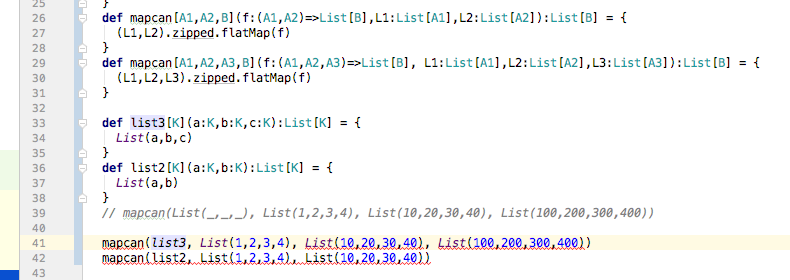It could be that this is again related to the left to right type inferencing limitation of the scala compiler as in More help understanding the _ variable
but let me ask it anyway.
In the code below, I’m attempting to write several arity versions of mapcan, which should behave similar to flatMap but with higher arity. The compiler errors are confusing to me.
def mapcan[A1,A2,B](f:(A1,A2)=>List[B],L1:List[A1],L2:List[A2]):List[B] = {
(L1,L2).zipped.flatMap(f)
}
def mapcan[A1,A2,A3,B](f:(A1,A2,A3)=>List[B], L1:List[A1],L2:List[A2],L3:List[A3]):List[B] = {
(L1,L2,L3).zipped.flatMap(f)
}
def list3[K](a:K,b:K,c:K):List[K] = {
List(a,b,c)
}
def list2[K](a:K,b:K):List[K] = {
List(a,b)
}
mapcan(list3, List(1,2,3,4), List(10,20,30,40), List(100,200,300,400))
mapcan(list2, List(1,2,3,4), List(10,20,30,40))
The compiler messages are these:
Error:(41, 10) type mismatch;
found : (Nothing, Nothing, Nothing) => List[Nothing]
required: (Int, Int, Int) => List[Nothing]
mapcan(list3, List(1,2,3,4), List(10,20,30,40), List(100,200,300,400))
Error:(42, 10) type mismatch;
found : (Nothing, Nothing) => List[Nothing]
required: (Int, Int) => List[Nothing]
mapcan(list2, List(1,2,3,4), List(10,20,30,40))
What confounds the situation even further is that IntelliJ highlights different errors than the compiler reports.
IntelliJ claims the following. Is this just an IntelliJ bug where it does not respect the same errors as the compiler?
Cannot resolve overloaded method mapcan.
Too many arguments for method mapcan(A1=>List[B],List[A1])
Too many arguments for method mapcan((A1,A2)=>List[B],List[A1],List[A2])
Unspecified value parameters:L3:List[NotInferredA3]
Too many arguments for method mapcan(A1=>List[B],List[A1])
BTW, my attempt here is to implement a Scala approximation of the Common Lisp function: MAPCAN
specified here: http://www.lispworks.com/documentation/HyperSpec/Body/f_mapc_.htm
My plan is to implement the 6 functions (mapc, mapcar, mapcan, mapcon, mapl, maplist) first for List, thereafter to extend the implementation to other collection types.
